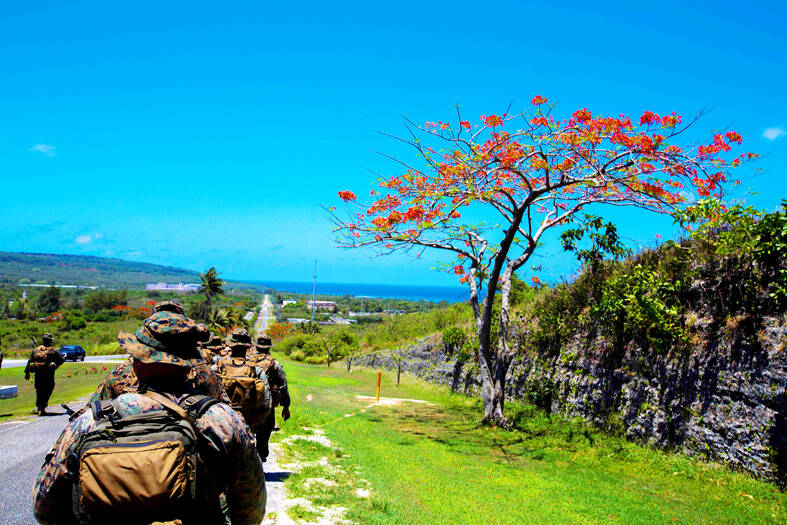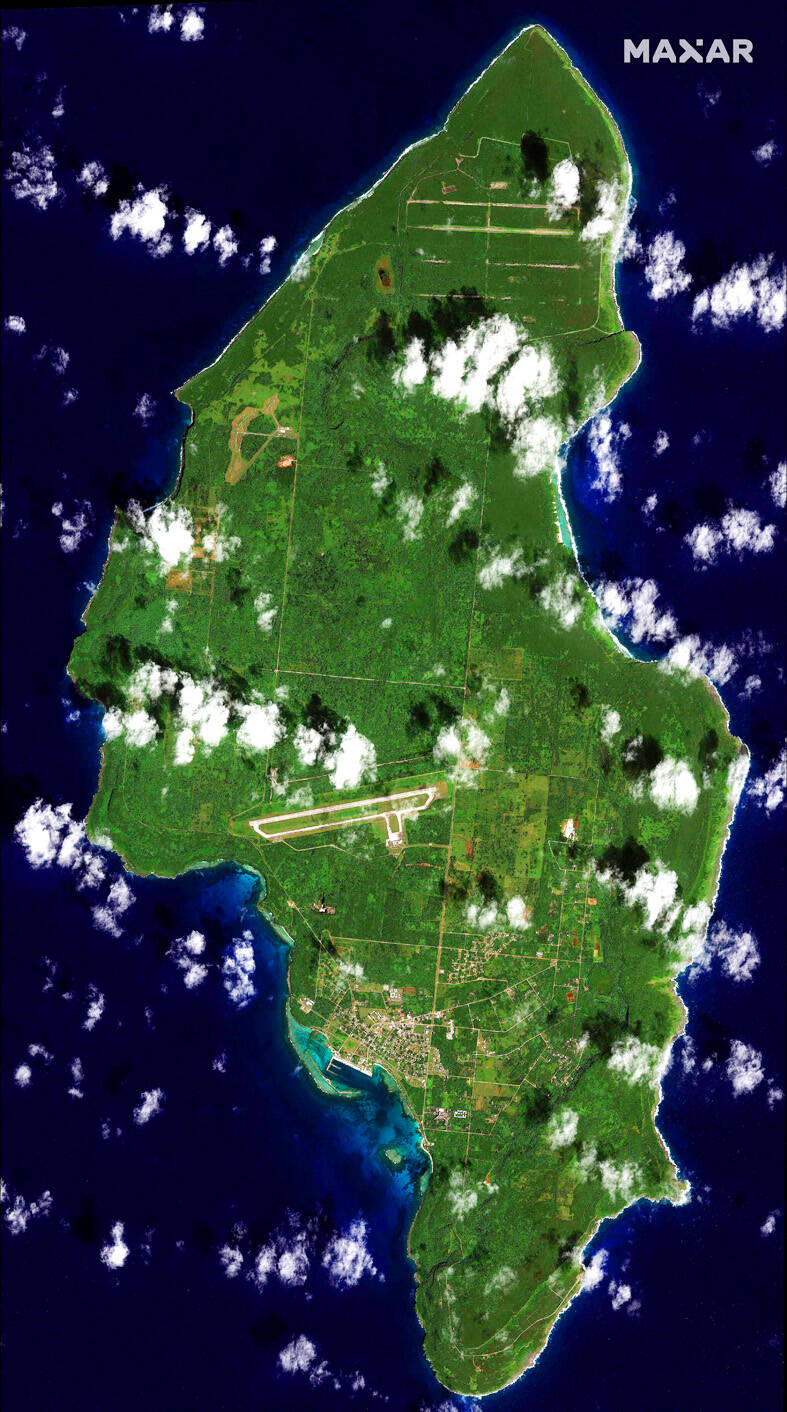In the middle of the Pacific ocean, an abandoned US airfield once key to dropping the nuclear bomb on Japan — and nearly lost to history amid encroaching forest — is being revived.
As the US hacks away at the jungle overgrowth at Tinian island airfield and other old, World War II-era bases across the region, it would not be with Japan on their mind.
Rather, it is Beijing’s growing influence in the Pacific that is spurring the recovery of a slew of abandoned runways on the 100km2 speck of land that makes up Tinian, part of the US territory of the Northern Mariana Islands.

Photo: AFP / Lance Corporal David Diggs / US Marine Corps
“Rehabilitation of World War II-era airfields has provided Pacific Air Forces [PACAF] a rapidly executable avenue to enhance infrastructure in the region,” a spokesperson said.
Although the statement mentioned a “sense of urgency” enabling the forces to “enhance ... warfighting capability and improve deterrent posture alongside allies and partners,” it did not mention China directly.
Washington’s plans for what officials have described as “an extensive” facility on Tinian comes amid a serious military pivot to the Pacific in the past few years — and as China builds its own new bases in the region, including in disputed waters.

Photo: handout / Maxar Technologies / AFP
“The most comprehensive and serious challenge to US national security is the [People’s Republic of China’s] coercive and increasingly aggressive endeavor to refashion the Indo-Pacific region and the international system to suit its interests and authoritarian preferences,” reads the US Department of Defense’s 2022 planning document, called the National Defense Strategy.
Tinian’s old military airfield “has extensive pavement underneath the overgrown jungle. We’ll be clearing that jungle out between now and summertime,” US Air Force General Kenneth Wilsbach recently told Japanese outlet Nikkei Asia.
Meanwhile, military projects for “fuel and airfield development” at the island’s nearby civilian airport are already underway, the PACAF spokesman said.
If little known now, the airfield at Tinian was perhaps the most important — and the busiest — in the world in 1945, as its six hastily built runways played host to US B-29 bombers carrying out missions against Japan, 2,300km away.
Including, on Aug. 6 and Aug. 9 of that year, the planes that dropped nuclear bombs on Hiroshima and Nagasaki. “Little Boy” and “Fat Man,” as the weapons were known, killed 200,000 people.
In the past three years, money annually allocated to Indo-Pacific military construction costs has doubled, from US$1.8 billion in 2020 to just shy of US$3.6 billion this year, a recent report from the US Congressional Research Service showed.
It is part of a Pentagon strategy to open a range of flexible military bases, able to operate outside of the larger, longstanding installations in Japan, South Korea and the US island territory of Guam.
On Tinian, initial work started near the civilian airport in February last year, before extending toward the World War II airfield on the north of the island.
Within two years, tarmac rehabilitation and the construction of fuel tanks are set to be completed, at a budget of at least US$162 million, part of contingency plans in the event “access to Andersen Air Force Base or other western Pacific locations is limited or denied,” Air Force financial documents showed.
Across multiple projects at Tinian, the total cost is unclear, “due to differing timelines and requirements, and the fact that not all work is being executed by the US Air Force,” the PACAF spokesperson said.
Tinian is not the only World War II-era base being revamped: New defense appropriations also include money for construction at Cesar Basa Air Base in the Philippines, “along with ongoing projects” at the Royal Australian Air Force’s Darwin and Tindal bases, the spokesperson said.
“A lot of our strategy there is taking many of the World War II airfields that frankly are overgrown by the jungle, and there’s still concrete or asphalt underneath,” Wilsbach said in a September speech. “We’re not making super bases anywhere. We’re looking for a place to get some fuel and some weapons, maybe get a bite to eat and take a nap and then get airborne again.”
Not far off, satellite images show other military developments — from China, which has created artificial islets among the diplomatically contested Spratly Islands (Nansha Islands, 南沙群島), used to host its own air bases.

Kehinde Sanni spends his days smoothing out dents and repainting scratched bumpers in a modest autobody shop in Lagos. He has never left Nigeria, yet he speaks glowingly of Burkina Faso military leader Ibrahim Traore. “Nigeria needs someone like Ibrahim Traore of Burkina Faso. He is doing well for his country,” Sanni said. His admiration is shaped by a steady stream of viral videos, memes and social media posts — many misleading or outright false — portraying Traore as a fearless reformer who defied Western powers and reclaimed his country’s dignity. The Burkinabe strongman swept into power following a coup in September 2022

‘FRAGMENTING’: British politics have for a long time been dominated by the Labor Party and the Tories, but polls suggest that Reform now poses a significant challenge Hard-right upstarts Reform UK snatched a parliamentary seat from British Prime Minister Keir Starmer’s Labor Party yesterday in local elections that dealt a blow to the UK’s two establishment parties. Reform, led by anti-immigrant firebrand Nigel Farage, won the by-election in Runcorn and Helsby in northwest England by just six votes, as it picked up gains in other localities, including one mayoralty. The group’s strong showing continues momentum it built up at last year’s general election and appears to confirm a trend that the UK is entering an era of multi-party politics. “For the movement, for the party it’s a very, very big

ENTERTAINMENT: Rio officials have a history of organizing massive concerts on Copacabana Beach, with Madonna’s show drawing about 1.6 million fans last year Lady Gaga on Saturday night gave a free concert in front of 2 million fans who poured onto Copacabana Beach in Rio de Janeiro for the biggest show of her career. “Tonight, we’re making history... Thank you for making history with me,” Lady Gaga told a screaming crowd. The Mother Monster, as she is known, started the show at about 10:10pm local time with her 2011 song Bloody Mary. Cries of joy rose from the tightly packed fans who sang and danced shoulder-to-shoulder on the vast stretch of sand. Concert organizers said 2.1 million people attended the show. Lady Gaga

SUPPORT: The Australian prime minister promised to back Kyiv against Russia’s invasion, saying: ‘That’s my government’s position. It was yesterday. It still is’ Left-leaning Australian Prime Minister Anthony Albanese yesterday basked in his landslide election win, promising a “disciplined, orderly” government to confront cost-of-living pain and tariff turmoil. People clapped as the 62-year-old and his fiancee, Jodie Haydon, who visited his old inner Sydney haunt, Cafe Italia, surrounded by a crowd of jostling photographers and journalists. Albanese’s Labor Party is on course to win at least 83 seats in the 150-member parliament, partial results showed. Opposition leader Peter Dutton’s conservative Liberal-National coalition had just 38 seats, and other parties 12. Another 17 seats were still in doubt. “We will be a disciplined, orderly